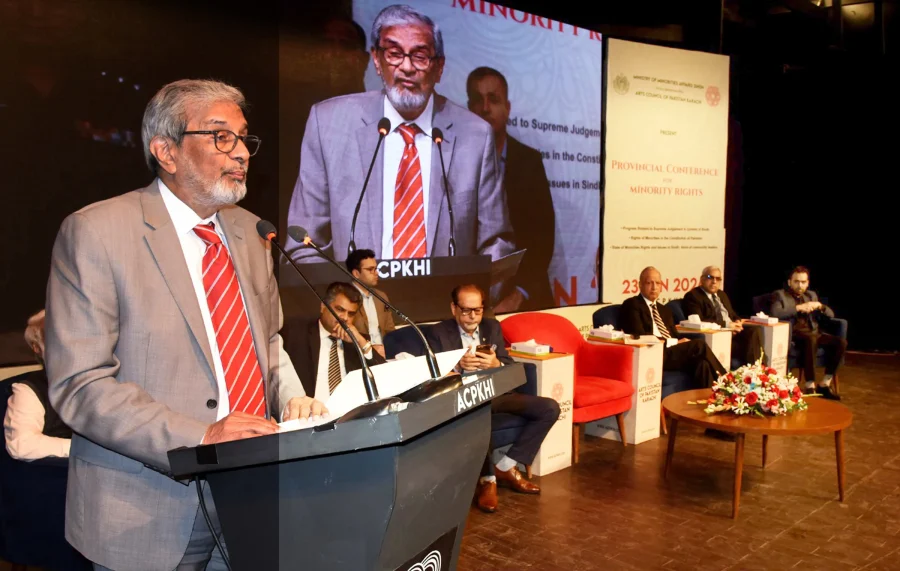Caretaker Sindh Chief Minister Justice (Retd) Maqbool Baqar while addressing the conference for minority rights said that no citizen should feel like a minority in their own country merely because they ascribe to a religion that is different from the one ascribed by a country’s majority. “I believe that weaponizing laws meant to protect religion and patronizing radicalism has sown the seeds of bigotry and parochialism.” The CM said that he has always believed that confronting uncomfortable truths and introspection is the key to a better future.
He added that conferences like these also have another crucial function: they reiterate our commitment to upholding the rights of non-Muslim citizens, particularly their right to freely profess, practice, and propagate their faith. The conference was organized by the Department for Minorities Affairs in collaboration with the Pakistan Arts Council on Tuesday. Today, fundamental rights and civil liberties are in jeopardy throughout the world as right-wing regimes attempt to further marginalize vulnerable communities, the CM said and added that the Indian Supreme Court validated the regime’s decision to build a temple on the site of the Babri mosque.
“At the same time, despite pressure from radical elements, courts throughout Pakistan have done well to uphold religious liberties, often at the peril of violence from such radical groups,” he said. Justice Baqar said that in 2014, the Supreme Court took Suo motu cognizance of a horrific attack on a church in Peshawar. While laying down clear directions for the protection of religious sites, the Supreme Court held that “We are all members of one race of humans with common challenges, and we cannot confront these challenges without forging a common alliance. This paradigm shift in the world around us can be achieved at the international and domestic levels only by discouraging sectarian, racial and ethnic biases which are violative of shared values and fundamental rights, and by the promotion of and strict compliance with these values and rights.”
CM said that we have often failed to protect non-Muslim citizens. “I consciously choose not to use the word minority because I believe no citizen should feel like a minority in their own country merely because they ascribe to a religion that is different from the one ascribed by a country’s majority,” and added that weaponizing laws meant to protect religion and patronizing radicalism has sown the seeds of bigotry and parochialism.
The interim CM said that as a signatory to international conventions such as the ICCPR, we must take concrete steps towards broadening the frontiers of religious freedom. “The journey ahead may seem arduous, but all monumental journeys begin with a single step,” he said and added that we must work for a pluralistic, democratic, and progressive Pakistan – a Pakistan where none of us is a minority, a Pakistan where our religious beliefs do not inhibit the opportunities we get. “I believe without pluralism and diversity, peace and prosperity shall elude us,” the CM concluded. Caretaker Minister of Information, Minority Affairs, Social Protection, and President Arts Council of Pakistan Karachi Muhammad Ahmed Shah emphasized that all resources allocated for minority affairs are intended for the benefit of the entire minority community.
He announced the release of two quarters’ funds for minority community initiatives, with the third quarter currently in the process of being released. Shah praised Sindh’s commitment, stating that no other province has accomplished as much as Sindh in the light of this commission.










